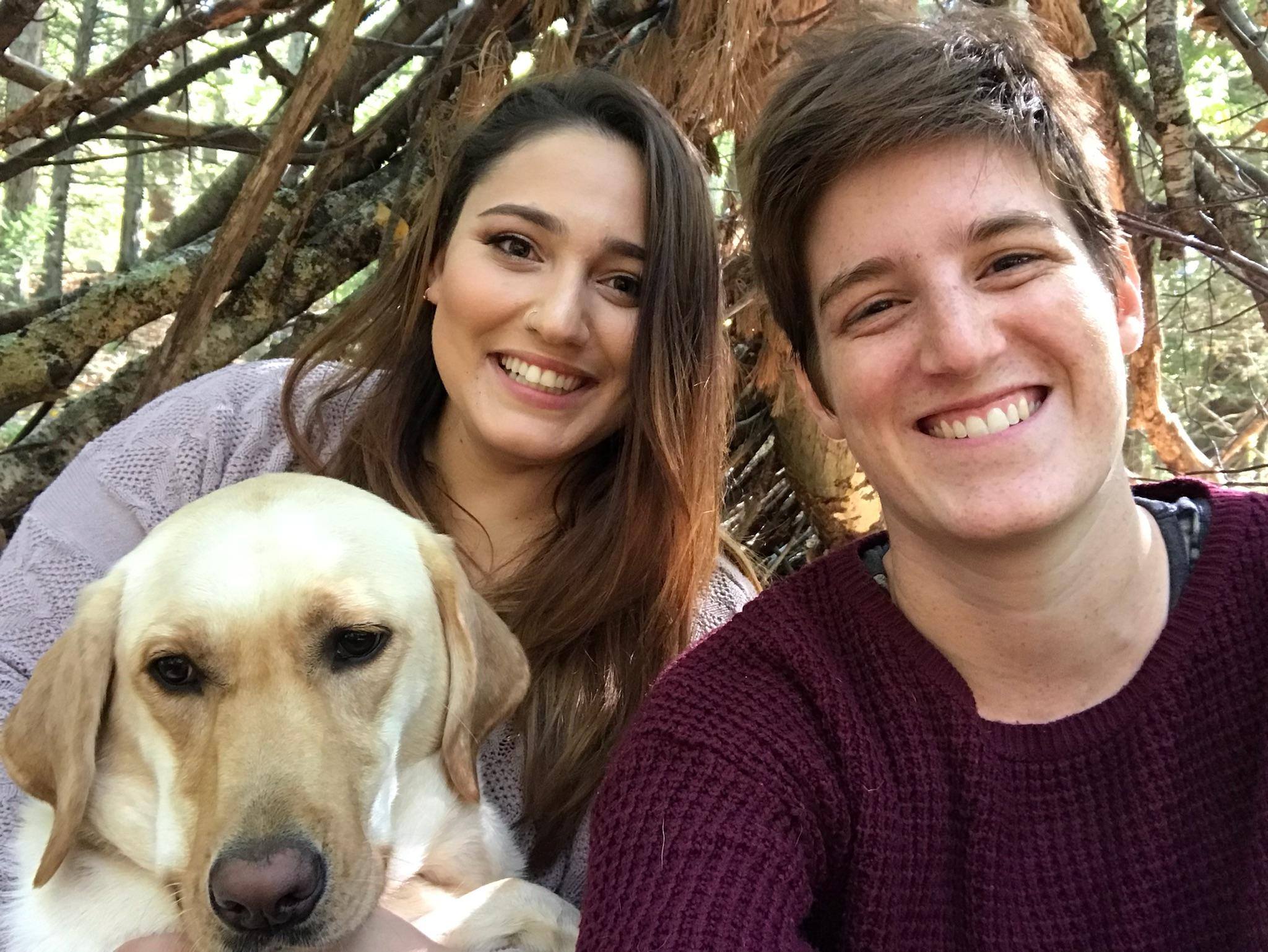For some people, sexual orientation feels rather black and white: they’re straight or gay. But for many others, it’s a land of gray that can challenging to navigate. Esther Schwartz, a 27-year-old Boston woman, is one of those people; dealing with her sexual identity has been really difficult, she says.
Schwartz, who is currently obtaining her masters in social work at Simmons College, is engaged to a woman. Her fiance, 30-year-old Amanda Thompson, identifies as a gay woman, or a lesbian. Many people assume those labels fit Schwartz, too, but they don’t feel quite right to her.
“There’s never really been a prototype for who I’ve fallen for, sexually or emotionally,” Schwartz says. As someone who has had long-term relationships with men, she doesn’t feel gay, she explains, and while she’s typically dated cisgender men and women, she was once attracted to someone who was transitioning genders, so the word bisexual doesn’t feel right, either.
“So I just identify as queer or pansexual, because that makes more sense to me,” Schwartz says. But this sometimes confuses people who learn she is engaged to a woman, and she wishes people wouldn’t fixate on the gender of her partner, but rather see that she’s simply found her person.
Read on to learn more about Schwartz’s journey to understanding and accepting her queerness and identity, overcoming trauma and abuse from past relationships, and finding her unlikely perfect match.
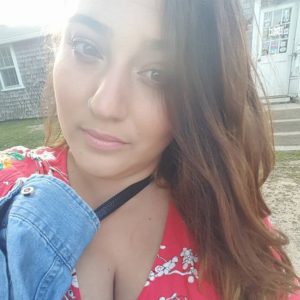
Profiles in Pride: How old were you when you figured out you weren’t straight, and when did you come out?
Esther Schwartz: I knew I wasn’t straight when I was 10 or 11, because I would have playdates with a girl from up the street. Even though we were best friends, we’d push the boundaries of what I think childhood friendship was. I knew that it was different, because I didn’t do that with any of my other friends who were female. We would kiss, cuddle in ways that were more intimate. Ever since 11 years old and on, behind closed doors, I was off and on with men and women.
I can’t pinpoint a coming out in my life. There’s no grand story; there’s no magical exploration that happened for me. I was more just like I’ve been in a lot of really emotionally and physically abusive relationships; I have a lot of trauma in my past. Around four-and-a-half to five years ago I got out of a relationship with a man who was nice, but he was very empty and he did a lot of drugs. The abuse with him was emotional entrapment. I’d try to leave and he’d threaten suicide or threaten self-harm of some form. It was never overt abuse, but it was abuse that was definitely emotional and weighed a lot on me.
Then after that, I found out the only way I could really get away from him was to tell him I cheated on him. I’d tried to break up with him in all the normal channels — being like, “Hey I’m not happy, I don’t want to be together.” And there was always a retort of “we can work things out, don’t worry about it, we’ve got this, I love you, let me buy you something,” then there was a pseudo-proposal. I said yes because I was so anxious. I realized my only escape was just to say I cheated on him. He asked what I did, and I said I just kissed someone. Because I was first of all lying, and I don’t want to hurt this person. He was like, “Oh, just a kiss? That’s fine, no problem.”
So then I went back to the drawing board. I was like, what lie can I create? So I said I had sex with my friend Emily. He said, “Alright, we’re done.” So that was over with. Then I briefly dated said Emily. I had been in relationships with girls before, but I realized I didn’t know the depth, the emotional highs and lows I could feel with a woman as well as a man. So that was when I realized I could definitely be in love with anyone.
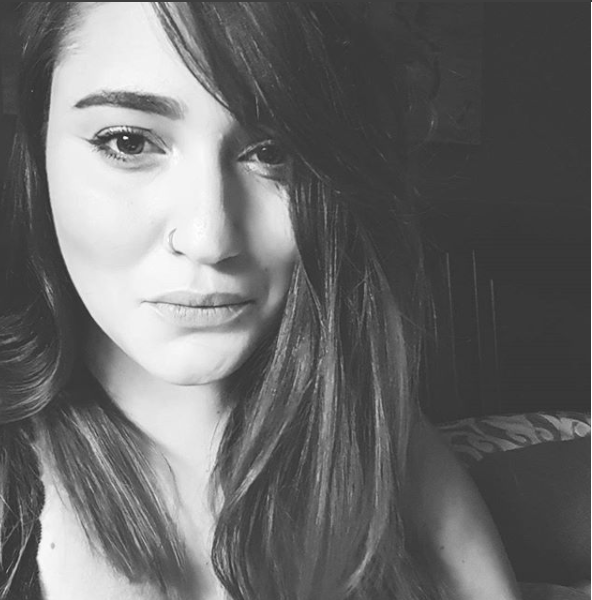
PIP: How did you meet your current fiance?
ES: When that relationship kind of went to shit, I went on OkCupid and I was just searching around and going on a wide variety of dates. That’s a whole ‘nother story, of just the dates you go on off those kinds of websites! After a lot of dates and a few experiences with people who were so self-righteous about being part of the LGBTQ community, which I appreciate now, but at the time, it was a little off-putting. I met up with this one girl; we got drinks and I saw an ex of mine who happened to be a guy. We gave each other hugs in a very amicable way, and she was mad, like, “You’ve been with men?” She had all these assumptions about me. I said, “Are you denying me my sexual preference because I’ve once been with a man?” I got put off from that for a while.
Then I went back to OkCupid and I found Amanda, who is my current fiance. I thought, this girl looks absolutely like nothing I’m into. Physically she’s attractive, but she’s wearing a sports hat, driving a red car, is from a town that’s very blue collar. I let my judgments cloud it. But I said, you know what, fuck it, and I messaged her. We just started talking. That was August 2013, and I was going away on vacation with my family. I think we talked every day for like two to three weeks via text, phone, and FaceTime from my computer. Our conversations were rich and we were getting really close. I was coming home from vacation and she proposed, “Hey, do you want to go on a date?” And I said, “Yeah, for sure.”
She came over, and I think my father may have been completely ignorant, but I think my mother had a woeful ignorance about the fact that all the girls I’d had sleep over at my house weren’t all just my friends. You don’t just make new friends different weeks. I think my mom kinda knew, but didn’t want to know. When Amanda came and picked me up, I was like, “Oh, it’s my friend Amanda!” My mom said, “From where?” And I said, “Bye!”
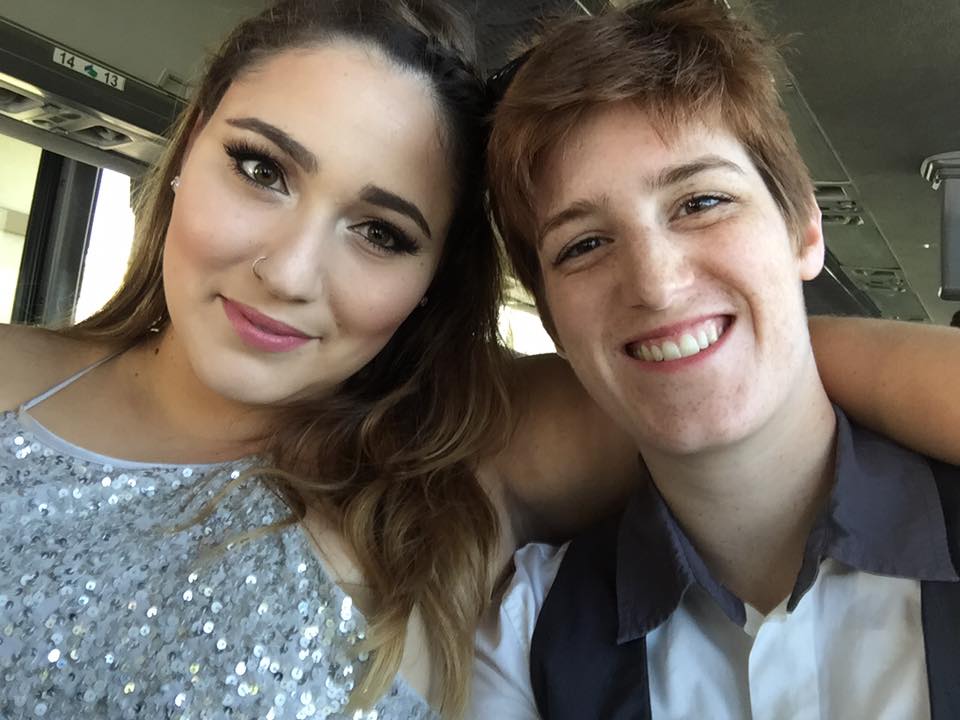
We went out, and immediately I knew this person is a person I’m interested in. We started dating, and I think I kind of brought my severe trauma into the first part of the relationship, so I fell really fast really hard. She did as well and also was bringing a lot of baggage from a past relationship she wasn’t over, where she was really hurt. So from about September to November 2013 we were dating and together and exclusive and really very happy, and then it was that November and I felt in my heart, she was just pulling away.
Then one evening she was with her brother and they were in a car accident, and luckily nobody got hurt, but my nature as a person is to obsessively care about people. That night when she got in the accident and I didn’t hear from her, I was bombarding her with texts. I think the part of her that was kind of broken was like, “This is over, you and I are done.”
That was the first time I definitely realized that the depth of emotion that I feel for a woman is much deeper than I can feel for a man. Even though it was only a few-months-long relationship, I guess I realized in comparison, the emotions I had felt for Amanda were so much deeper even for the relationship I’d had for years with men. That was a big thing for me.
So when she broke up with me, I was very angry, resentful, and upset. But that’s when I realized at least in my own head, OK, I’m definitely not straight, I’m definitely not gay, I’m definitely not confused — I’m queer. I’ve been queer my whole life. That’s what I am. That’s what it was.
PIP: What happened next?
ES: We broke up and I was really emotionally wrecked. I went back to the drawing board, meeting people, drinking away my sorrows, hanging out with people who were of no interest, but I was filling up my time. Then I was with this girl who was very isolating. She was like, “You are mine, you are my thing.” That opened my eyes to the fact that the trauma and the aggressiveness I’d experienced with men wasn’t isolated to just men; women could be like that as well. She was just super emotionally aggressive and like I was her property, very demonstrative in her language. It was just bad.
Amanda broke up with me around November 8. Then it was close to Christmas. I was bored and texted Amanda, but I didn’t expect any sort of text back. Then she texted me back. She came over that night and we kind of reassessed everything. She said she was still really hurt from her past relationship, and I said I was really hurt from my past trauma. Then we worked through a lot of stuff and we got back together officially on January 1, 2014, and since then we’ve been together.
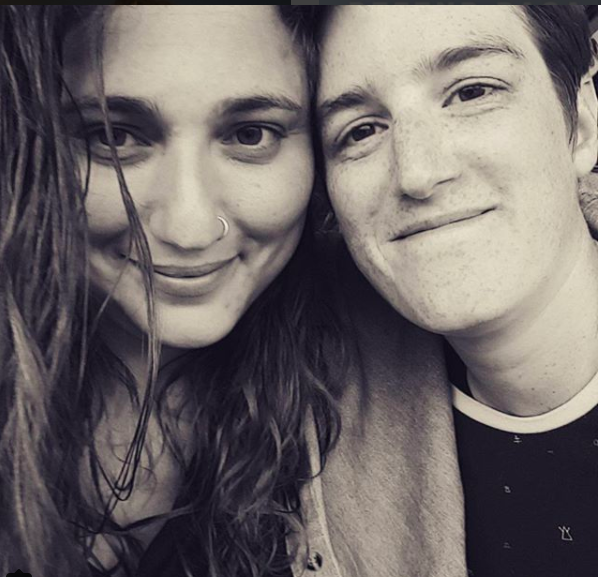
PIP: How has being with her impacted your identity?
ES: I think when I kind of declared my outness is when I finally felt comfortable that this is my person forever. This was probably like two years ago. I’m 27, so at 25 I’d say I came out. It wasn’t like a coming out to anyone really, it was more so just like, I’ve found the person I want to spend the rest of my life with and there’s no second guessing this, I have no question. Because Amanda and I both worked through a lot of trauma together and separately. I think we just realized everything we’d been holding onto from our past related to relationships, gender, sexuality and all of that was resolved.
So we’ve been together four years, but I think for the last two we realized there was this cosmic force that brought us together. We both kinda believe in God; we don’t really know what it means, but it makes us both really emotional when we think about it, because now we’re wedding planning. She’s just my person. When people say, “What are you, a lesbian?” And I’m like, no. Then they’re like, “Why are you marrying a woman?” It’s a loaded question. I’m marrying a woman because I’m in love with a woman. Why are you marrying a man? The answer is, “Well, I’m straight.” So I don’t know, there’s a lot of questions around my sexuality, especially with people from my past who have known me as the Esther who has dated guys.
PIP: You mentioned you’ve dated both men and women seriously. I’ve encountered some women who have been rejected in queer communities for dating men. Have you experienced any of this?
ES: Mostly no, but that’s only because of my past and some of the trauma I’ve experienced, I really don’t let that many people in my life. Amanda is a very unique person, and she’s very close with very few people, but the people she’s close with are her whole world.
So I didn’t really have a community per se that was going to disown me, but when Amanda and I are out or we’ve gone to LGBTQ events in the Boston area, I definitely feel myself fluffing up how gay I am because I feel like I’m not gay enough.
That’s not anything anyone else has done to me, it’s moreso like I feel pressured to do that myself. I feel like I’m not enough to be a part of this community sometimes, but that’s self-imposed. That’s not anything I can identify as having happened externally.
While I haven’t personally dealt with that, I know that a lot of people have. To me it’s heartbreaking. Because it’s like, if you’re in a marginalized population and then you try and explore what that means to be a part of a marginalized population and you return to that group and you’re disowned, it kind of reinforces the idea that you’re worthless or not good enough, and that’s sad to me. I’m sad to hear that it happens as much as it does, because I know it does; I have friends who have experienced it.
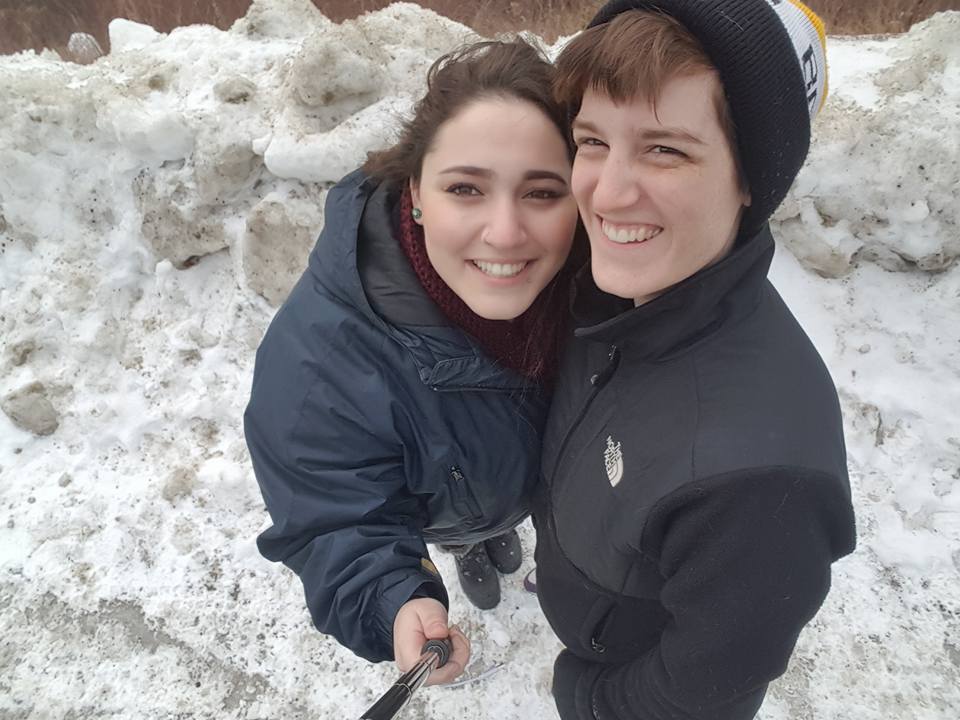
PIP: Were any of your friends surprised when you started dating Amanda, or did they know you are fluid with who you’re attracted to?
ES: Anyone I’ve ever considered a friend has kind of always known. For me, it was a nonstarter. If someone was not cool with me being me and not making any allowances for that, that person just wouldn’t be my friend. I have a really unique, diverse group of friends, and 99% of my friends are cisgender females who are straight and who have never in their lives thought of a woman as anything other than a friend. So I’ve had no real problems with my friends.
PIP: Are there any other experiences or challenges you’ve encountered that you’d like to talk about?
ES: I’d say three things come to mind.
The first: I think there’s a biological guilt that comes with being queer. Because I want to reproduce, and that’s a huge part of my identity as a woman. I know that same desire resonates with Amanda, so we both know we can never lay down together and create a human. So there’s a really big painful void there for us, knowing that we have to welcome in another person into the situation. That’s nothing we would ever choose to do if we could biologically have a child of our own. That’s a really painful experience. And with wedding planning comes baby planning. We’re on a clock because we can’t just jump in bed together and have a baby, we have to plan, financially map out how we’re gonna have a kid.
Another thing I’d say is a lot of people who know somebody who’s been raped or sexually assaulted by a man and who identifies as a woman and ends up with a woman, there’s a preconceived notion you’re just with a woman because you were raped by a man. To me, that judgment is not only dangerous emotionally, it’s dangerous societally.
Because then you’re associating rape with love and not rape with what it is, which is a violent act of oppression and aggression and violence, and that’s all it is. There’s no association with anything good.
The third thing that comes to mind:. I think that even though I live in Massachusetts and even though I live in a state that preaches inclusivity, and I live in a sanctuary city in really trying times right now, sometimes Amanda and I feel like wherever we are, we feel like we have to be queer and be part of the community. Even at times when we just want to be ourselves and we don’t want to identify as anything but Amanda and Esther. We feel like for the sake of our brothers and sisters and anyone in between, we have to constantly be a part of the community. Because right now it feels really scary that if we’re not speaking up, that someone else will stop being vocal. Then visibility will die down, and being visible right now for us is really important.

